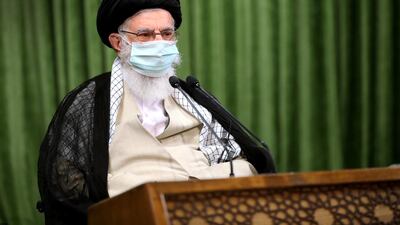Iran's judiciary said it had executed an Iranian agent linked to the CIA on Tuesday, its news site Mizan reported.
Reza Asgari, a former employee of the ministry of defence, had sold information about Iran's missile programme to the CIA and was executed last week, judiciary spokesman Gholamhossein Esmaili said, according to Mizan.
"In the last years of his service, he joined the CIA, he sold information about our missiles ... to the CIA and took money from them," Mr Esmaili said. "He was identified, tried and sentenced to death."
Occasionally Iran announces arrests and convictions of alleged spies for foreign countries, including the US and Israel.
In June, Iran said another alleged spy, Jalal Hajizavar, was hanged in a prison near Tehran. The report said Hajizavar — also a former staffer of the defense ministry — had admitted in court that he was paid to spy for the CIA. The report said authorities had also confiscated espionage equipment from his residence. It said the court sentenced Hajizavar's wife to 15 years in prison for her role in the espionage.
Before that, in 2016, Iran executed a nuclear scientist convicted of spying for the United States.
The two countries have been locked in a series of escalating incidents, including the US drone strike killing an Iranian general in Baghdad and an Iranian ballistic missile attack targeting American troops in Iraq.
On the same day, Iran's judiciary said that a court had upheld death sentences for three people linked to deadly protests last November sparked by a hike in petrol prices.
The sentences were "confirmed by the supreme court after the defendants and their attorneys appealed," spokesman Gholamhossein Esmaili said, quoted by the judiciary's Mizan Online website.
Iran's President Hassan Rouhani said on Saturday that lockdowns meant to curb the spread of the pandemic could lead to street protests over economic problems, his website reported.
In a regular Cabinet meeting on the coronavirus, Mr Rouhani said the easiest way to fight the virus is to close off all activities. But "then people come and stage protests because of chaos, famine and problems," he said.
Mr Rouhani's remarks came as many experts urged a halt to business activities to stop the increase in virus related deaths that have exceeded 12,600 out of 255,117 confirmed cases.
Iranian officials have been particularly eager to remove restrictions on its economy, already crippled by sanctions the US imposed after the Trump administration's 2018 withdrawal from the 2015 nuclear agreement.
A sharp rise in subsidised gasoline prices led to four days of unrest in cities and towns across Iran in November, which rights group Amnesty International said led to more than 300 people being killed in clashes with police and security forces.
Tehran has yet to release any official statistics about the scale of the unrest, though in June the government acknowledged that the security forces shot and killed protesters and a politician said that 230 people were killed in the anti-government protests.

